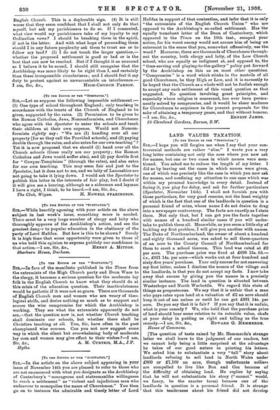[To THE EDITOR Or TUE " SPEOTATOIt."] Six,—In the article
on the above subject appearing in your issue of November 14th you are pleased to refer to those who are not enamoured with what you designate as the Archbishop of Canterbury's "courageous and statesmanlike willingness to reach a settlement" as "violent and injudicious men who endeavour to monopolise the name of Churchmen." You then go on to instance the admirable and timely letter of Lord
Halifax in support of that contention, and infer that it is only "the extremists of the English Church Union" who are opposed to the Archbishop's so-called settlement. Has the equally trenchant letter of the Dean of Canterbury, which appeared in the Times on the 10th inst., escaped your notice, for his worst enemy would not accuse him Of being- an extremist in the sense that you, somewhat offensively, use the word ? Moreover, there are thousands of Churchmen through- out the country, both clergy and laity, of the Low Church school, who are equally as indignant at, and opposed to, the "time-serving and playing-to-the-gallery" policy put forward by the Archbishop on this as on most other questions. " Compromise " is a word which stinks in the nostrils of all good Churchmen, be they High or Low, and it is earnestly to be hoped that the Church as a whole will not be foolish enough to accept any such settlement of this vexed question as that suggested. No question involving great principles, and especially where religion is concerned, has ever been perma- nently solved by compromise, and it would be sheer madness for Churchmen to acquiesce in the present proposals for the sake of attaining a temporary peace, and that without honour.
—I am, Sir, &c., ERNEST JAMES. 62 Cleveland Gardens, Barnes, S. W.
































































 Previous page
Previous page